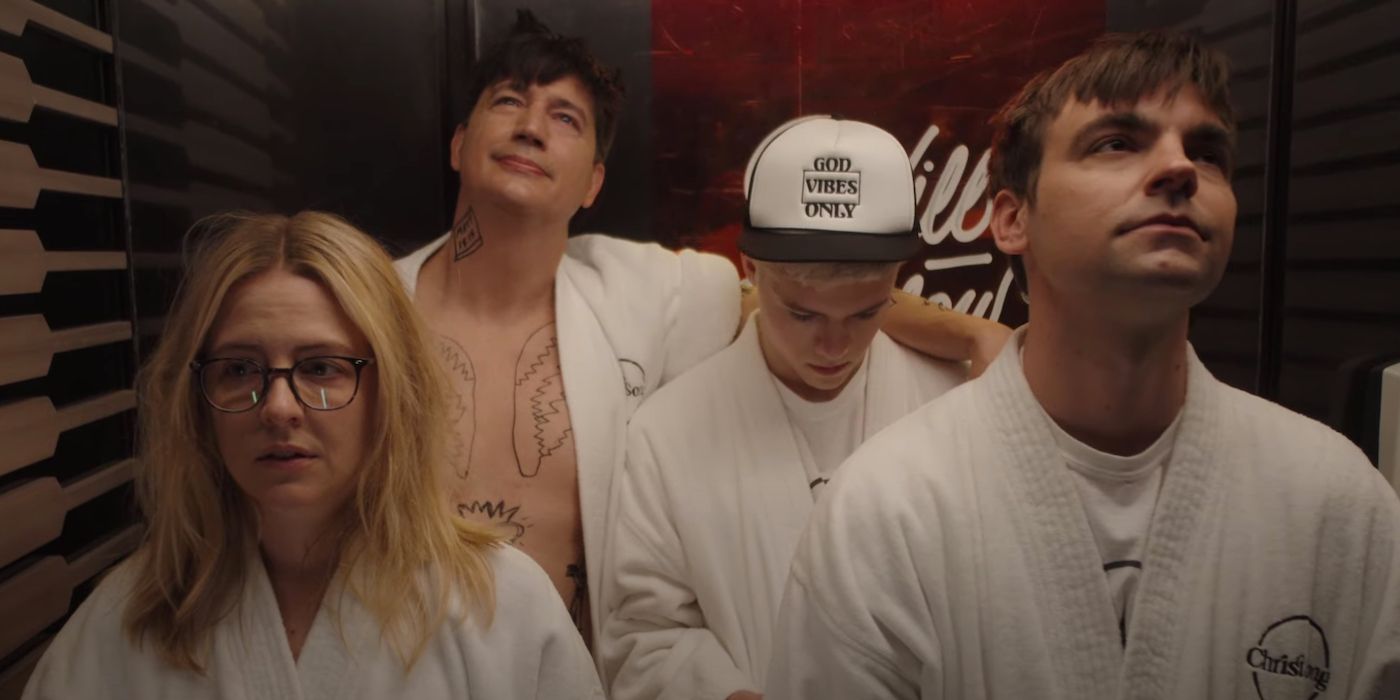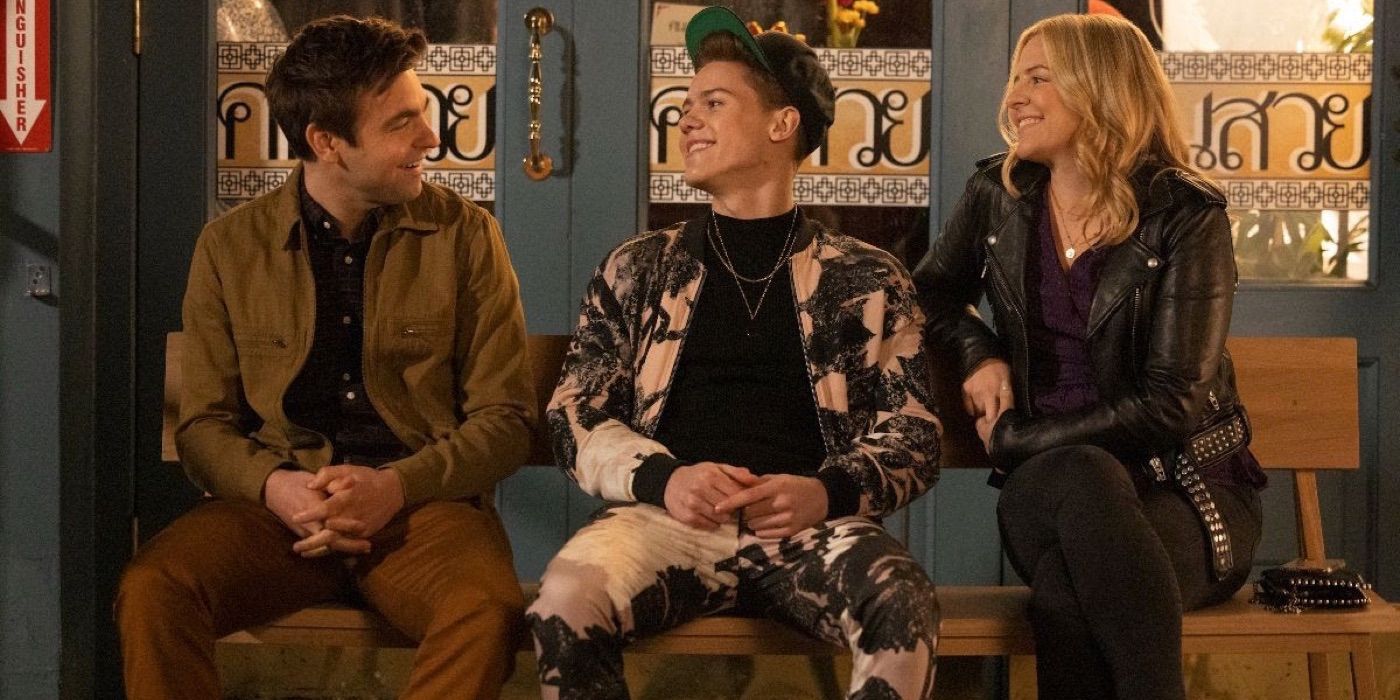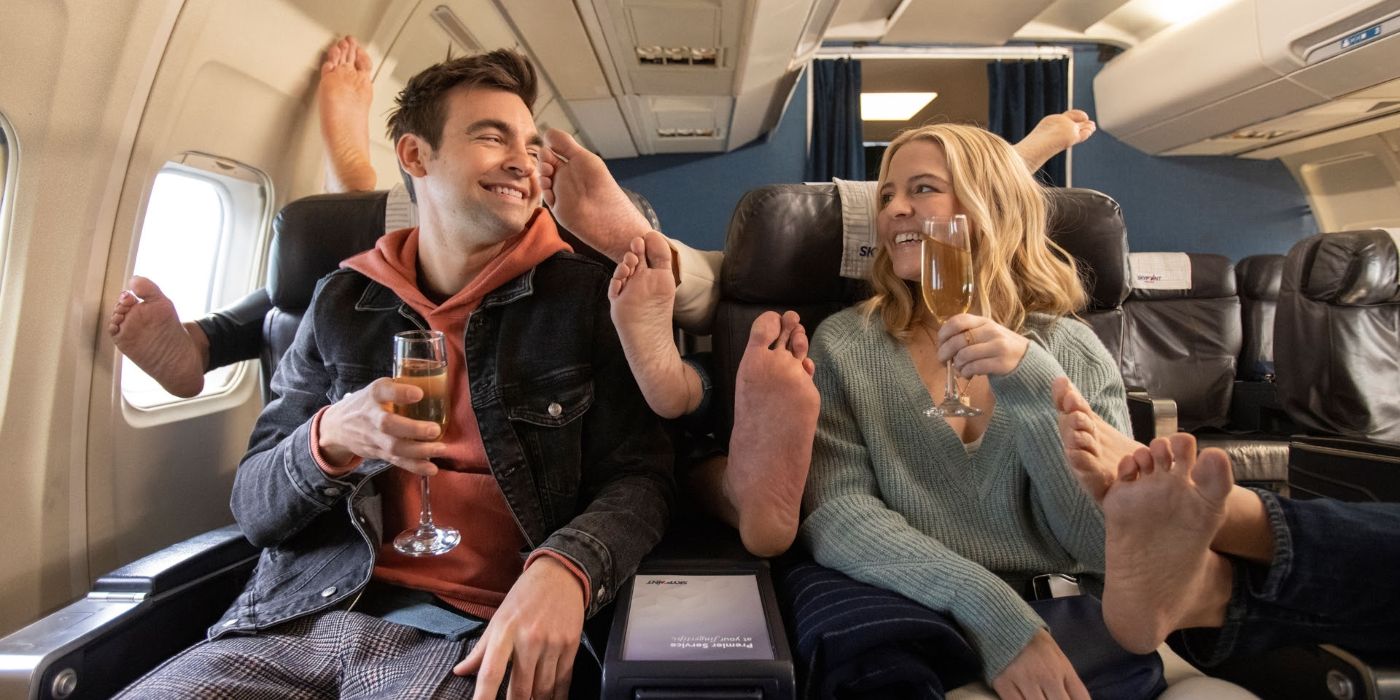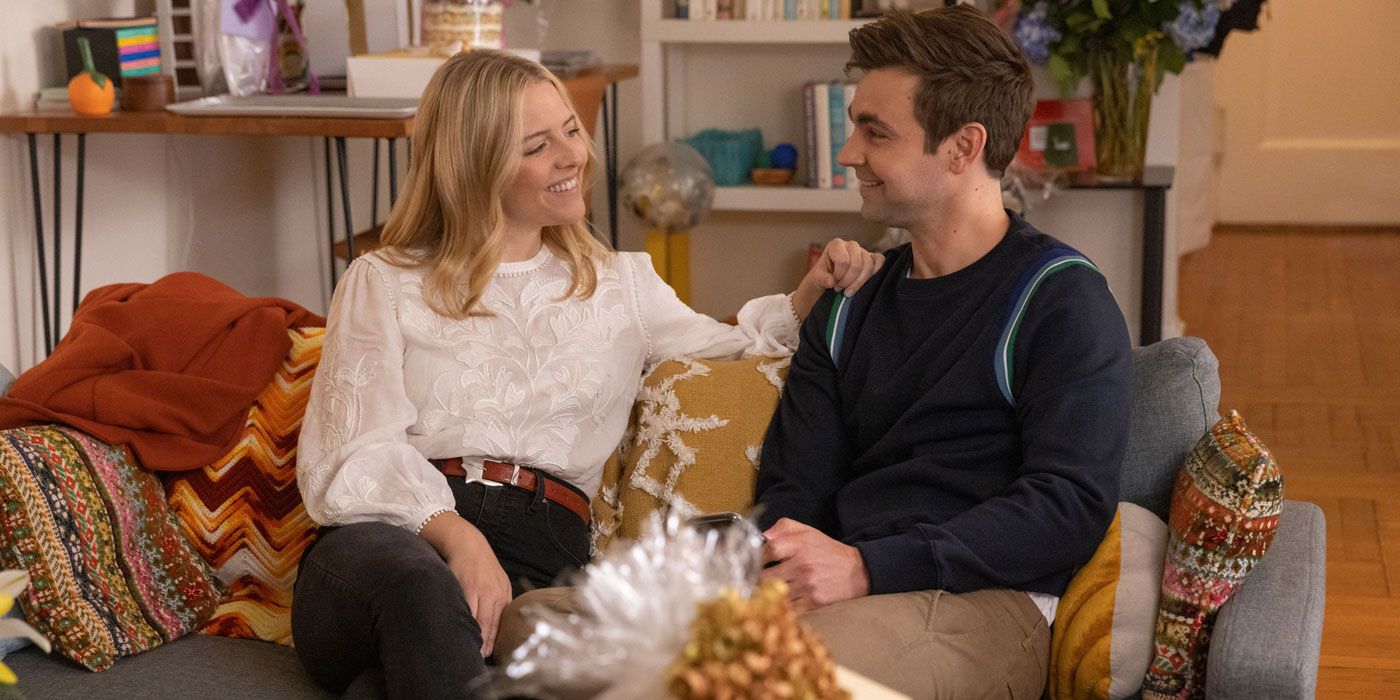Other Two: Season 2 Ending Explained by the Creators
[Editor's note: The following contains spoilers through the Season 2 finale of The Other Two, "Brooke & Cary Go to a Fashion Show."]
The Other Two isn't really about fame and fortune — it's about what it's like to feel like it's always just out of your grasp. The HBO Max comedy just recently wrapped its second season and was greenlit for a third, which should take us even deeper into the journey of Brooke (Heléne Yorke) and Cary (Drew Tarver), as they try to balance career and family after their teenage brother Chase (Case Walker) becomes an overnight success.
In a phone interview with Collider, creators Chris Kelly and Sarah Schneider talked about the show's transition to HBO Max from Comedy Central (and how that might affect the writing going forward), how they made sure the season-long tease of an Alessia Cara appearance would come true, and Chase's journey as he continues to grow up a little more. We also dug into how they approached the ending of Season 2, and how Season 3 may avoid the pandemic but continue to evolve Cary and Brooke's own paths to success.
Collider: So it was a real pleasure to see more and more people get to discover the show over the course of the season. Did you have a sense of that happening?
SARAH SCHNEIDER: Yeah.
CHRIS KELLY: Yeah, a little bit, yeah. It was nice. It felt like it kept building more and more week to week. I think once people know they can binge something, they're like, "Okay, there's 15 episodes or 20 episodes now, I'm going to do it." I understand that as well. So yeah, it's been fun.
Also, getting two episodes every week feels like a nice rhythm.
SCHNEIDER: Yeah. That was what Hacks did, and we really liked that rollout. And weirdly, not intentionally, but our episodes paired nicely together, thematically. So we were really happy that they were down to do it that way.
Along those lines, when you write Season 3, are you going to be thinking about things like release strategy and how episodes should be potentially paired together?
KELLY: Oh God, I don't know. You can never really count on anything. I don't know if it would be released the same way or not, but now I will. Now I will think about that.
SCHNEIDER: Oh my God, Liz. Put us in our heads already. I mean, one thing that is nice is that we had written the second season for Comedy Central. So it was written with the typical three-act structure, four if you include the tag. So we were writing to commercial breaks. And so when we ended up shooting this show, we still had those because that's how the show was written. So I'm curious because HBO Max doesn't necessarily have those, and that may impact how we break and write for the season in a different way. That'll be an interesting exercise.

Yeah. I feel like I've heard other writers who have gone from broadcast to streaming, and how on the one hand, they've freed themselves from that structure. But at the same time, I think a lot of them end up using it anyway, just because it's familiar and it's also reliable in terms of story structure.
KELLY: Yeah. I know. We also felt the same way about our runtime. Our episodes obviously could be a little longer than the 21 minutes, but we try not to make them go on too much longer. We tried to keep ourselves in line, too, because we didn't want to all of a sudden get to HBO Max and have these very just rough cuts. We didn't want 30, 35-minute comedy episodes. So I think a little bit of structure, like you're talking about, is still helpful to keep in mind, to keep things right and tight and organized.
Absolutely. So I want to ask a couple of specific Season 2 questions. First of which is, when it came to The Gay Minute and writing jokes and bits for that element, how many alts were there?
KELLY: What do you mean? Like for topicality?
Or just in general. It feels like kind a springboard for having a writers' room just go to town, creating dozens of other things that can happen to Laura Dern.
KELLY: On the day of, there were no alts, only because you move so fast and furious that we just hardly do alts on the day. I think we did an alt, instead of Laura Dern, we had a version that was... Who was it? Olivia Colman?
SCHNEIDER: Yeah.
KELLY: And then we went back to Laura Dern in the edit, so we had alt people. We had alt people, but not alt jokes.
SCHNEIDER: Yeah.
The season features Chase trying to figure out what his role in this new phase of his career is. When you were breaking the season, what were you thinking about there?
SCHNEIDER: Yeah, we wanted to do something different with the season. We obviously left him at the end of the first season, exposing his lack of singing ability. And so we knew we were going to pivot him and do something different with him. And so we went this route of all the non-singing stuff that singers do to, to create their empires and stuff. I don't know exactly where we're going to take him next, but what we found was interesting was in both these two seasons, he sort of is a pawn. There's a lot of people deciding what he does. There's a lot of people telling him what his next move is. And not a lot of that is coming from within. He doesn't have a lot of agency as a character.

And so throughout this season, he's trying to ask and check in a little bit more about, "When can I sing? When can I start my new album?" And people are sweeping his wants under the rug. But he becomes more and more galvanized in wanting to get out there into the world, which he actually wishes he could do. And so by the end, in the finale, he literally is like, "Here is the issue. I want to sing. No one's letting me sing. And now I'm saying it ballsy so you guys cannot ignore me anymore." So this character really has agency for the first time, which is a new vibe for him. This is so long-winded to talk about the little kid pop star on our show, but we do like that he now has sort of put it on the table, and he can't be ignored, what he wants to do. And so hopefully moving forward, he has a little more power, a little bit more, a little tiny bit more, in what his next step might be.
KELLY: I mean, he's such a sweet little kid, so we really liked the hopefully surprising power of having him just say, "Fuck you, Brooke," after so long. One of the tricky things about writing this show, but we like, and it was a choice we made early on, which is, because it's called The Other Two, we are really close with Brooke and Cary. We're always experiencing things from their point of view. We're not just ever experiencing Pat or Chase, we're experiencing Cary or Brooke's experience of Pat or Chase. So we don't really just do a scene of Pat and Streeter together. You know what I mean? If you see Pat and Streeter, it's because Cary or Brooke is there. And so it was really fulfilling to get to flip the script in the finale and do a whole episode from the point of view of Pat and Chase. Because then you're like, "Oh, I get to see them as human beings a little more than I've ever been allowed to." Which was fun to write.
SCHNEIDER: Yeah, totally.
And I think what works about the way Chase blows up in the finale is that he's definitely angry, but he has a very valid point.
SCHNEIDER: Totally.
KELLY: Yeah, we tried to write this like where everyone has a valid point. Because you're right, he does have a valid point, no one is listening to him. But at the same time, you also understand a little bit why they're doing what they're doing. Maybe you don't understand the fact that they've been ignoring him, but the season started with him being like, "I'm not going to go back to college anymore. I want to come back, and I'm going to be a singer." And they all know he can't really sing. So at least Brooke started with the best of intentions of being like, "I want to help my little brother, and he went to NYU and was kind of bullied, and he wants to come back, and he can't sing." So she's trying her best to help him come back into the fold. She means well, but then, episode by episode, slowly but surely, you see that he's getting more upset, and she's not listening. And then she's getting her own stuff going on, it's coming back to... We wanted everyone to kind of be right and wrong. There's no villain in the fight, you know? Yeah.
In terms of the finale, was there ever an alternate ending discussed? Was it always the idea that Brooke would peace out with Chase and Pat?
SCHNEIDER: We sort of knew, weirdly, we knew that we wanted to give Brooke and Cary this decision of if they were going to choose their family or their most recent career success. And we knew that we wanted Brooke to go with her family and Cary to go do his movie. We just knew that. That felt right to us. And then it was just a matter of calibrating it, or trying to calibrate it in such a way that when Cary's not there, you're not like, "Fuck Cary!" We wanted people to feel for him and be like, "That was a hard call, but that was the right call for him, for his character, at this point in the show." That's what we wanted to show.

KELLY: Yeah. Cary made the right decision, and Brooke made the right decision. Because also we look at it as Cary is off trying to get his win and do this movie. But we also feel like Brooke already got her win. You know what I mean? Like the fact that she started the first episode being like, "I want Alessia Cara to DM me back," and it's like, "Girl, Alessia Cara is not going to fucking DM you back." Like, "You're in manager drag, you're pretending to be a manager, but you aren't a manager. You don't know what you're doing, girl, get real." And then by the end of Episode 9, she did get Alessia Cara. So she already got her win. She's already validated by, she is a real girl, you know what I mean? She really went from pretending to be a manager to actually getting the validation of a real pop star wanting her to manage her. So even if she doesn't actually manage her moving forward, the very fact that someone wanted her to was the validation she needed. And so, "You know what? I'm going to go, and I'm going to go with my mom and my brother." You know?
In terms of Alessia Cara, in Episode 1, when you wrote that in, did you write it knowing that by Episode 10 you'd have her in the show?
KELLY: Yeah, we wrote the whole season ahead of time. And we were very cognizant of that. Like, "Okay, Heléne Yorke is going to have to say Alessia Cara over and over again all season, so we'd better make sure she'll do it." So we just shot out of order. That scene where she meets Alessia Cara is one of the first things we shot, to make sure that we actually got her. And we went back and filmed all the other scenes.
That is a really smart idea.
KELLY: Yeah, that was stressful. Yeah, it was stressful.
So talking a little bit about Season 3 — not that you have too much to say, I'm sure, at this point, but based on the final moments of Season 2, have you made a decision about how to proceed in terms of incorporating the pandemic?
SCHNEIDER: We haven't really started talking about the season yet, but we do know that we aren't going to pick up in real-time and then have the family live through the pandemic. There's not really a special pandemic season or anything. We just sort of thought that, because our show is so grounded in reality, and then the real world and comments on what's going on socially in pop culture and stuff... It felt sort of odd for us to continue in a parallel universe where there was no pandemic. So we thought that joke let us acknowledge it, and then we can now sort of move forward in time without having to do a whole season that's about it or experiencing it in real-time.
KELLY: Yeah. We don't really know how we'll handle it. But we will certainly see. Yeah. We don't even know, down to the nitty-gritty of, does that mean Cary doesn't do his movie? Does he do his movie, but does he do it but it has to happen differently than he thought it was going to happen? We don't know. We know nothing.
I've been mentioning this show to a lot of people because of the way in which it talks about the idea that you can hit a level in your career where you're doing great, but then you're just kind of focused on what you don't have. When it comes to Season 3, do you have a sense of what the next evolution of that idea is?
SCHNEIDER: Oh my gosh.
KELLY: We don't really.
SCHNEIDER: No.
KELLY: But I mean, it's kind of like what you're saying, though. It's like, there is no done, you know what I mean? Like what's so fascinating is, I think at the very beginning of Season 1, Cary would have heard, "You're going to be in a movie with Patricia Arquette," and he would have imagined like, "Holy shit, that's the end! I've reached it! I'm done!" And we were like, "No, there are still seasons and seasons left of you failing after that." It's like, "Oh, how could I possibly have one more bad day after that news?" You know? And it's just, that's how it goes. You know what I mean? No one ever feels done.
SCHNEIDER: What is going to be fulfilling? And that's always changing, and that's always presenting new complications. And so whatever we do next with them will just be sort of the next evolution of that journey for them.

Hacks just had a great night at the Emmys, and there's some overlap betweeen the that show and your show in terms of writers and performers. how do you feel about the different ways TV shows has been exploring the world of entertainment?
SCHNEIDER: I think it's definitely the setting for our show, but I think both of our shows are trying to explore bigger ideas. Our shows take place... Their jobs are in the entertainment industry, but regardless of what your career is, you can relate the idea of being overworked and feeling lonely because you don't have time to yourself, or you've missed out on certain parts of your life in exchange for others, putting more focus on others. And so even though all our shows are taking place sort of in the entertainment world and commenting on it, the themes feel very universal, and the ideas and experiences they're based on feel universal. They're shows about being overlooked, and... There are just these ideas that are universal at the core, and then the execution or the setting for them is just sort of... We live in this world, so it's our point of reference.
Well, I can't wait for Season 3, and I also totally understand if you guys need to take some time to make it.
KELLY: Yeah, we're like, "We've got to start thinking about this, I guess."
The Other Two Seasons 1-2 are streaming now on HBO Max. Season 3 has been greenlit.


التعليقات على الموضوع